Last book-list of the month for 2021, and then I’ll be posting my complete 2021 BookList.
My December reading list is unusually lengthy (partly because at least one book was finished in November, another begun then. And another book was begun well over a year ago, only finally turned the last pages at the end of 2021.). So long that I debated splitting it into two posts, but then your comments will be here and there, and I really like to keep them in one place. They’re such a valuable reference, source of so many recommendations for my TBR list.
So you might want to split your reading into two shorter sessions, or skim for titles than interest you, but I do hope you find something here that you want to read, and I hope you’ll drop in for the conversation below. Or come back a bit later — I know many of you will have just read Sue’s latest book post (with her playfully imagined book gathering in a log cabin in the snow. . . sigh) and perhaps you’re temporarily “all booked out.” (Except really, are readers, ever?)
As usual, my comments on my reading are drawn directly from my Reading Journal, jotted down as soon after completing the book as I can manage (which has been known to stretch a few weeks). And these last few months, I’ve been transcribing the notes rather than simply posting photographs of those pages. Some readers still seem to enjoy seeing the analog version, though, and it has begun to be important to me that I write these with my fountain pen in the lined pages of my Kraft-board-covered.
Also as usual, the numbering in my list started with #1 in January 2021; I use it for easier retrieval of titles.
82. Standard Deviation, Katherine Heiny. Literary fiction; Comedy of manners; Comic Fiction; Marriage; Parenting; Asperger’s; New York City.
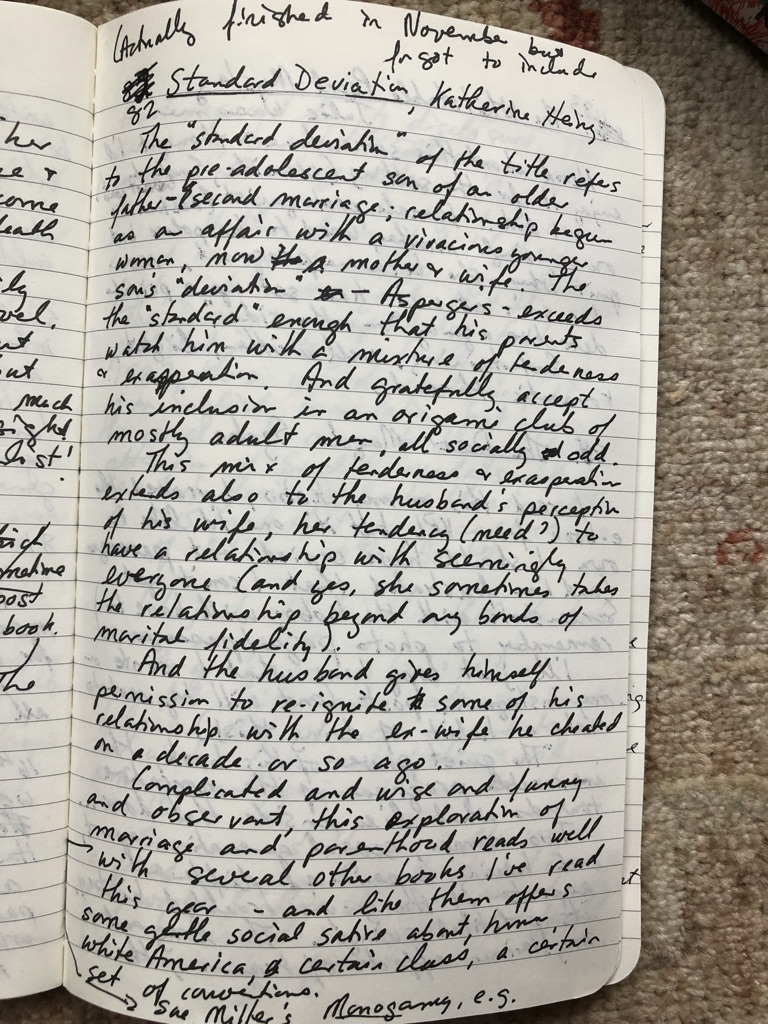
The “standard deviation” of the title refers to the pre-adolescent son of an older father in his second marriage; relationship began as an affair with the vivacious younger woman who is now mother and wife. The son’s “deviation” – Asperger’s — exceeds the “standard” enough that his parents watch him with a mixture of tenderness and exasperation. And gratefully accept his inclusion in an origami club of mostly adult men, all socially odd or awkward.
This mix of tenderness and exasperation extends also to the husband’s perception of his wife, her tendency (need?) to have a relationship with seemingly everyone (and yes, she sometimes takes the relationship beyond any bonds of marital fidelity).
And the husband gives himself permission to re-ignite some of his relationship with the ex-wife he cheated on a decade or so ago.
Complicated and wise and funny and observant, this exploration of marriage and parenthood reads well with several other books I’ve read this year — and like them offers some gentle social satire about, hmmm, white America, a certain class, a certain set of conventions. e.g. Sue Miller’s Monogamy, Maggie Shipstead’s Seating Arrangements, just for a start.
Instagram posts here, here, and here — the two latter links feature two of my favourite laugh-out-loud passages. Worth clicking through for the chuckle. Seriously.
83. The Whitstable Pearl Mystery. Julie Wassmer. Mystery novel; Female protagonist; Set in England; Whitstable Pearl series.
I heard about this somewhere and thought I’d enjoy it for the setting (seaside, English East coast) and I did. Female protagonist: restaurant owner, single mother, used to be police but quite when she became pregnant; now her son’s at university, she’s set up a private detective agency “on the side.
Entertaining, well-written, light, romantic thread.
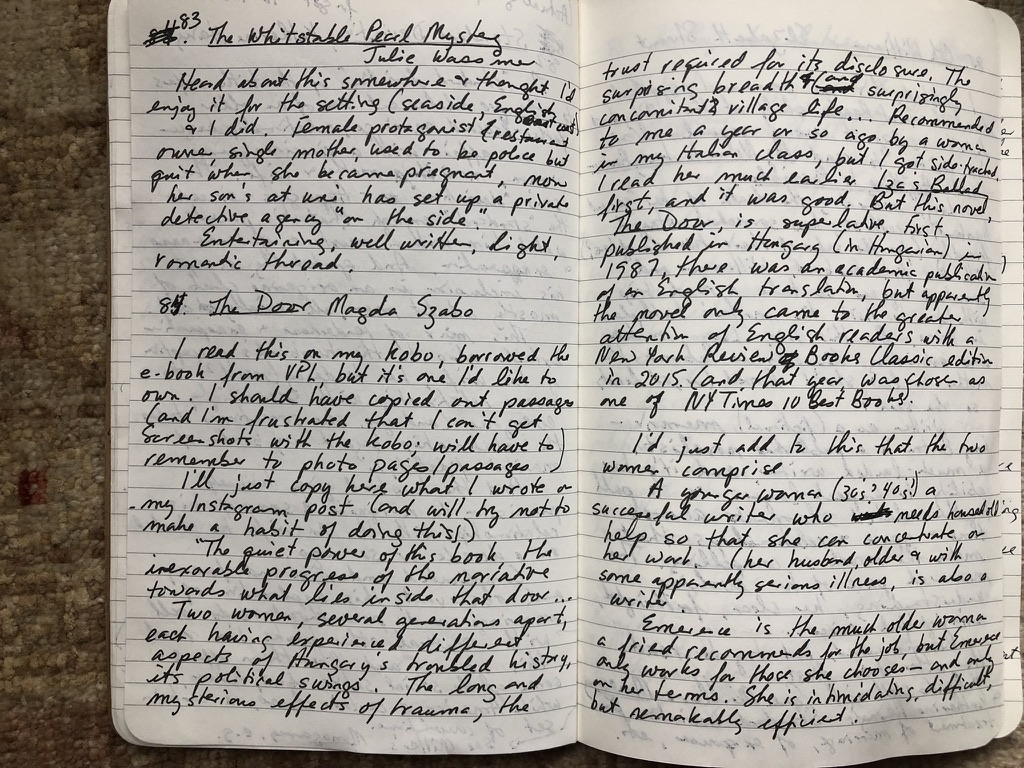
84. The Door. Magda Szabo. Translator, Len Rix; Literary Fiction; Hungarian writer; Books in Translation; NYTimes 10 Best Books; Women’s Lives; Female Writer; Hungarian politics and history.
I read this on my Kobo, borrowed the e-book from Vancouver Public Library, but it’s one I’d like to own. I should have copied out passages (and I’m frustrated that I can’t get screenshots with the Kobo; will have to remember to photograph pages/passages).
I’ll just copy here what I wrote on my Instagram post (and promise I will try not to make a habit of doing this).:
“The quiet power of this book, the inexorable progress of the narrative towards what lies inside that door . . . Two women, several generations apart, each having experienced different aspects of Hungary’s troubled history, its political swings. The long and mysterious effects of trauma, the trust required for its disclosure. The surprising breadth (and surprisingly concomitant narrowness) of village life. . . . Recommended to me a year or so ago by a woman in my Italian class, but I got sidetracked. I read Szabo’s much earlier Iza’s Ballad first, and it was good. But this novel, The Door, is superlative. First published in Hungary (in Hungarian) in 1987, there was an academic publication of an English translation, but apparently the novel only came to the greater attention of English readers with a New York Review Books Classic edition in 2015 (and that year it was chosen as one of New York Times 10 Best Books).”
I’d just add to this that the two women comprise
A younger woman (30s? 40s?) a successful writer who needs household help so that she can concentrate on her work (her husband, older and with some apparently serious illness, is also a writer)
Emerence is the much older woman a friend recommends for the job, but Emerence only works for those she chooses — and only on her terms. She is intimidating, difficult but remarkably efficient.
Highly recommended!
85. Oh William. Elizabeth Strout. Literary fiction; Contemporary American writer; Female writer; Women’s lives; Marriage; Poverty; Childhood trauma; Memory.
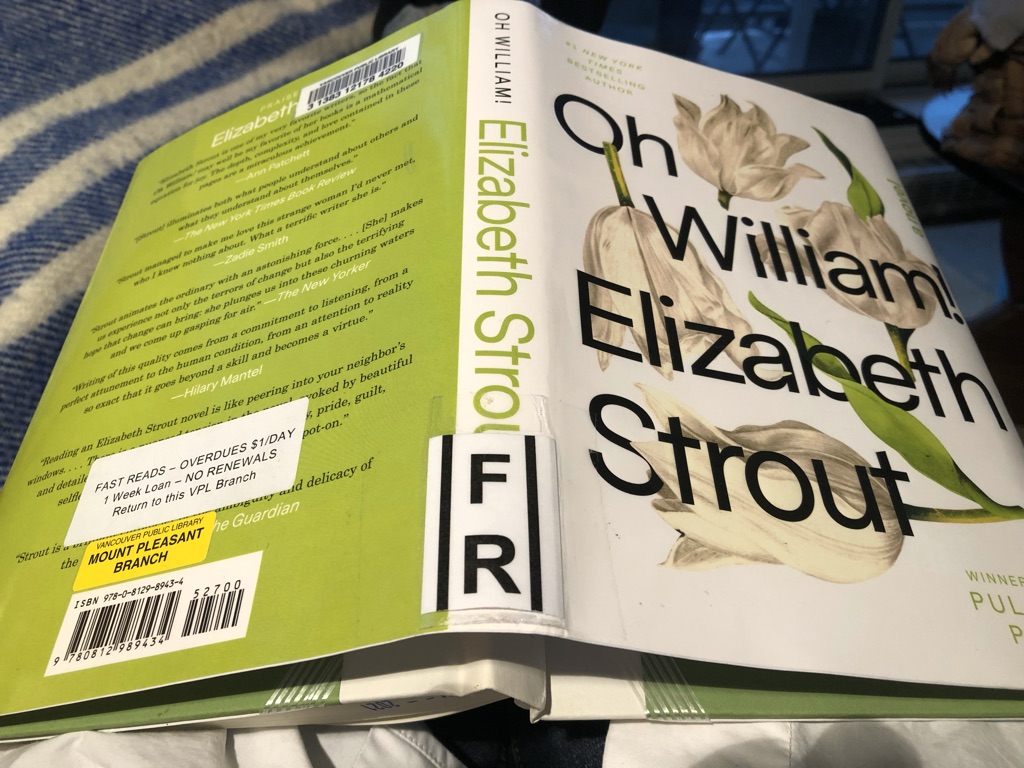
I grabbed this as soon as I spotted it on the Fast Reads shelf at the Vancouver Public Library, but didn’t realize it was a sequel — Now I’m waiting to read My Name Is Lucy Barton and Anything Is Possible.
Lucy, mourning the death of her second husband, a cellist whose childhood was as marked by poverty as her own, has somehow stayed friendly (for the sake of their two daughters?) with her first husband, William — and somehow agrees to take a road trip with him to visit his mother’s birthplace in Maine. On this trip, Lucy makes some astonishing discoveries about the mother-in-law she’d loved (or, at least, so she said; she’s re-evaluating now).
Written as a (fictional) memoir , by Lucy Barton, a published novelist, a much-lauded writer whose ability to unpeel layers and to pull together related elements across time and space and relationships makes the novel so compelling. The measured pace of her evolving understanding, her clear, forthright, insightful voice.
Recommended, but probably better to read the other two first. Oh, and I think this would read well with Sue Miller’s Monogamy or Katherine Heiny’s Standard Deviation for treatment of marriage, of ex-spouses, etc. Among others. . .
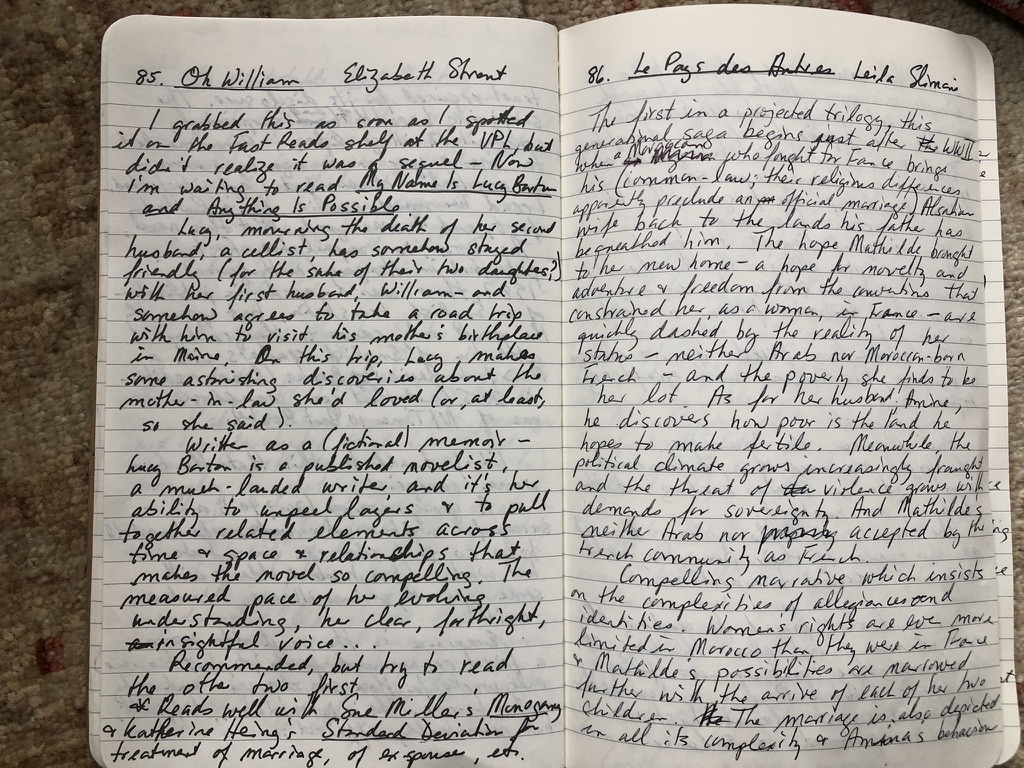
86. Le Pays des Autres. Leila Slimani. Literary fiction; En français; 1st of projected trilogy, a generational saga; family history; Moroccan history; French colonial history; historical fiction. Available in an English translation (by Sam Taylor) as The Country of Others.
The first in a projected trilogy, this generational saga begins just after WWII, when a Moroccan who fought for France brings his (common-law — their religious differences apparently preclude an official marriage) Alsacienne wife back to the lands his father has bequeathed him. The hope Mathilde brought to her new home — a hope for novelty and adventure and freedom from the conventions that constrained her, as a woman, in France — are quickly dashed by the reality of her status — neither Arab nor Moroccan-born French — and the poverty she finds to be her lot. As for her husband, Amine, he discovers how poor is the land he hopes to make fertile. Meanwhile, the country’s political climate grows increasingly fraught and the threat of violence grows with demands for sovereignty. And Mathilde is neither Arab nor accepted by the French community as French; both she and Amine are compromised, by their union, in their relationship with “their” community.
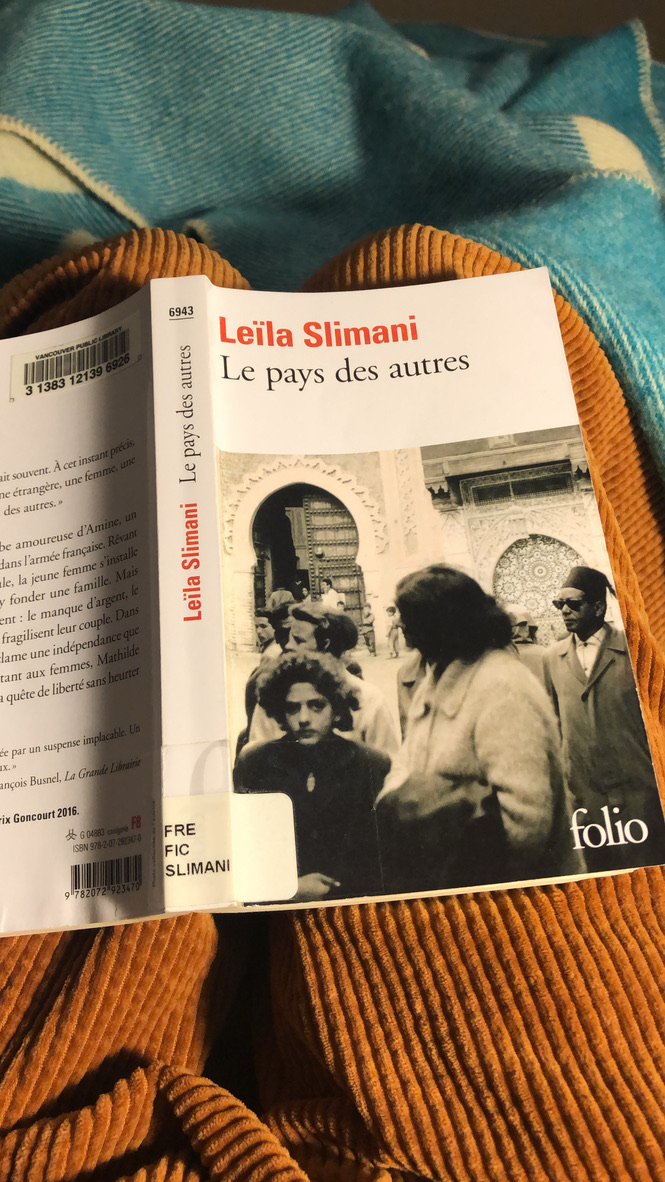
A compelling narrative which insists on the complexities of allegiances and identities. Women’s rights are even more limited in Morocco than they were in France and Mathilde’s possibilities are narrowed furether with the arrival of each of her two children. The marriage is also depicted in all its complexity and Amine’s behaviour is neither excused nor reduced to a simple misogyny. Mathilde’s strength is curtailed, yes, but she fights for herself and, especially, for her daughter. Defeat is inevitable throughout, and yet there are triumphs in survival.
The friendship she forges with the Hungarian doctor and his wife
The magical day at the beach
The impromptu clinic Mathilde somehow presides over, her immersion in medical textbooks filling a void in her life.
The orchards and fields Amine manages to produce, his success with grafting experiments
Against . . .
the violence; the burning; the forced marriage of a “dishonoured woman” after her severe beating at the hands of her brother; the cruelty of little girls, learned at the tables of their parents, all enforcing colonial hierarchies. . .
I’m looking forward to reading the next volumes . . . and also thinking of how well this complements Alice Zentner’s L’Art de Perdre (now available in English translation as The Art of Losing), both novels highlighting racist colonial histories France has preferred to silence, both written by female French citizens tracing their family history back two or three generations
My Instagram post on this book.
87. Hidden Depths. Ann Cleeves. Mystery novel; Police procedural; Female detective series; Vera Stanhope series; set in Northumberland, England.
Somehow I’d skipped this 3rd volume in the Vera Stanhope series — couldn’t even be sure when I read the online synopsis (had I read it? had I not?) so borrowed it from VPL — and nope, I had not, and happily settled right in.
A young boy (teen/young adult) is found dead in a bathtub, bedecked with flowers in the water. The stylized murder is followed by another, this next one of a beautiful young woman. Vera can’t help but be excited as well as concerned — a challenging puzzle to solve. But she’s chastened as well, aware of the mothers’ pain. At the same time, she’s processing her own sadness at never being able to be a mother herself.
A satisfying plot — the four close friends, birdwatchers the main connection, with an admired mentor and his lovely wife at their centre. . . . And now, I only have two Vera books left to read. I will miss her. . .
Instagram post for Hidden Depths.
88. Astonish Me. Maggie Shipstead. Literary fiction; ballet; romance; marriage; parenting; gifted children.
Very different from Shipstead’s earlier Seating Arrangements except that the research/observation of a particular social group / world / class is again keen and convincing — say I, who’s never been near either the Golf and Country Club / elite college network of Seating Arrangements nor the intense and competitive world of ballet. . . .
In this novel, the focus on a woman who wanted, from girlhood, to be a professional dancer (with no parental encouragement at all) and who comes to realize gradually that she will never move beyond the corps of a professional company . . . this is such a compelling question to consider. Watching Joan come to terms with her limitations (seeing the contrast with her roommate and friend, who moves into the solo roles and for whom Joan still manages to be supportive, happy) is moving and we only gradually begin to see how much this has to do with her failed relationship with the Russian dancer she’s helped defect.
Readers might be dismayed to see her exploit her high school admirer’s long-time love for her, using him as an exit strategy from the ballet world. Marriage and, quickly, parenthood. As might be expected, the early childhood years are tough, and Joan and her (apparent compromise) marriage/ husband grow into contentment and mutual love (although he wonders sometimes) . . . until their son’s developing passion for ballet takes them into new territory, and challenges, and revelations.
No spoilers, but I was fascinated to watch a new ballet / choreography being created, drawing on many elements that were decades and generations apart in the narrative.
Recommended.
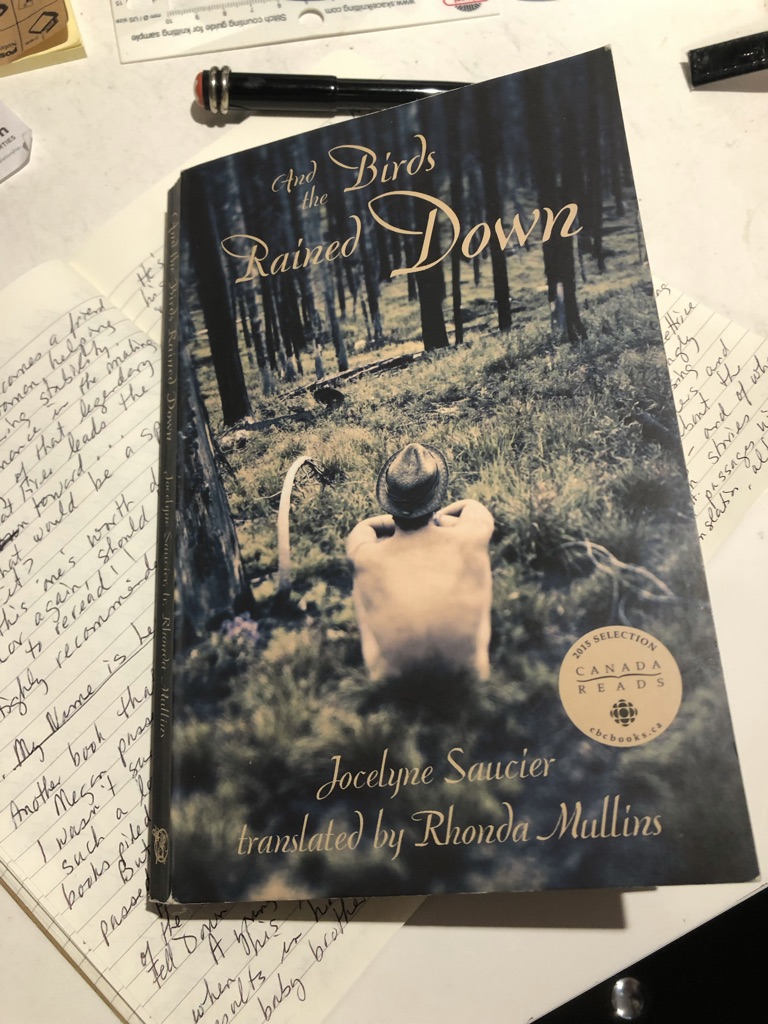
89. And the Birds Rained Down. Jocelyne Saucier. Translated by Rhonda Mullins. Literary fiction; books in translation; setting in Northern Ontario; life in the woods; old people/aging; photography; 20th century history and legend; love story; mystery.
Megan [my daughter] gave me this a few months ago, but I held off, not wanting to read it in translation now that I can read French quite well. But the copy is here and my daughter is curious to know what I’ll think of it, so time to get off that particular high horse!
And I LOVE this book. These characters, the old men, reprobates who have escaped from society to hide in their small cabins in Northern Ontario — sought out and found by a female photographer (40s?) who’s trying to find a survivor of Ontario’s Great Fires of the early 20th century. The legendary, storied man she’s searching for has apparently just died and been buried, but his friends whom she finds at the cabins are tight-lipped and she drives away, for now.
The story’s focus then shifts through various characters, the narrator punctuating it by speaking directly to us in meta-commentary. And the tiny community’s energy is changed again when an old woman arrives, “sprung” from an asylum by her nephew who has just discovered her incarceration there for over 50 years.
The photographer finds her way back to the group and becomes a friend and resource to the old woman, helping her integrate, offering stability. There is a romance in the making. And the mystery of that legendary saviour of the Great Fires leads the photographer toward . . . well, that would be a spoiler, wouldn’t it?
And this one’s worth discovering afresh (or again, should I be motivated to reread, which I might!)
Highly recommended!
My Instagram post includes an excerpted page to give you a sense of the writing.
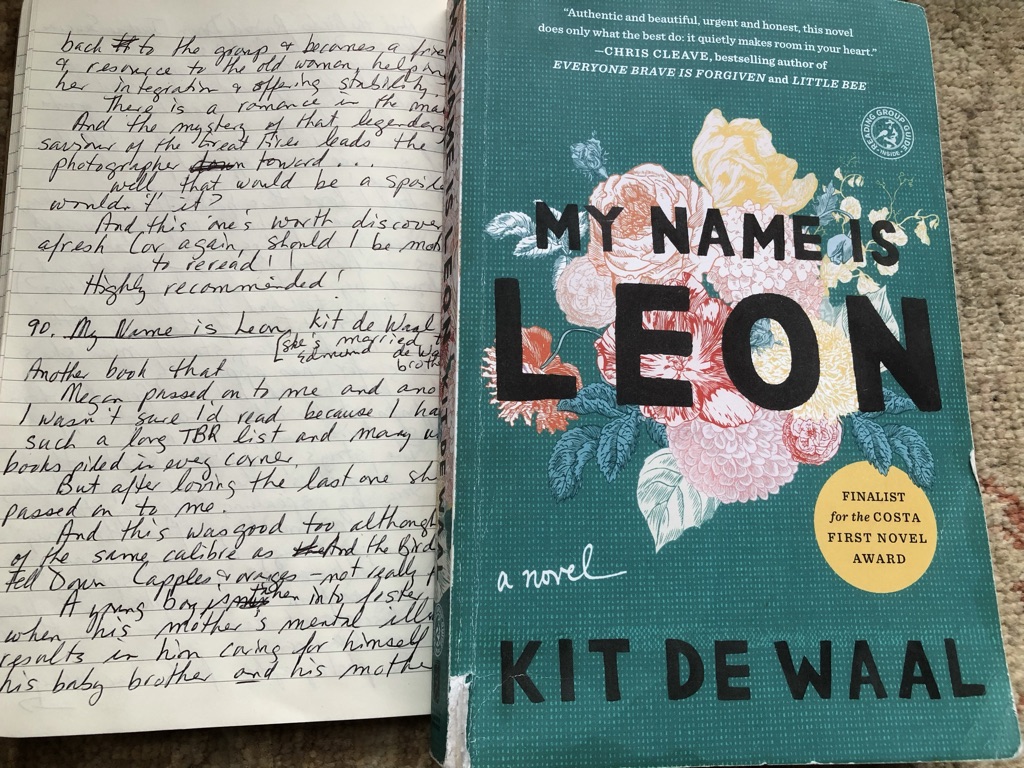
90. My Name is Leon. Kit de Waal. Literary fiction; Set in 1980s Birmingham; Black child in foster situation; Race/Class; Child Welfare.
(Kit de Waal is married to Edmund de Waal (The Hare with Amber Eyes)’s brother)
Another book that Megan passed on to me and another I wasn’t sure I’d read because I have such a long TBR list and too many unread books piled in every corner. But after loving the last one she passed on to me . . . .
And this was good too, although not of the same calibre as And the Birds Fell Down (apples and oranges — not a fair comparison).
A young boy is taken into foster care when his mother’s mental illness results in him caring for himself and his baby brother and his mother. He’s just beginning to settle in, to trust his foster mother and feel comfortable and safe when he learns that his brother is being adopted — younger and white, the brother is more adoptable than Leon, a big Nine who’s also mixed-race (his Black father hasn’t been in contact for years).
Credible, convincing (although the eventual outcome is perhaps too hopeful) and very moving story of Leon’s attempts to get back to his brother and to somehow find a place for himself. Indictment of child welfare system, of general lack of support for struggling families before apprehension. Child’s perspective, magical thinking, misunderstood eavesdropping, etc. very well-observed. Would read well with Shuggie Bain.
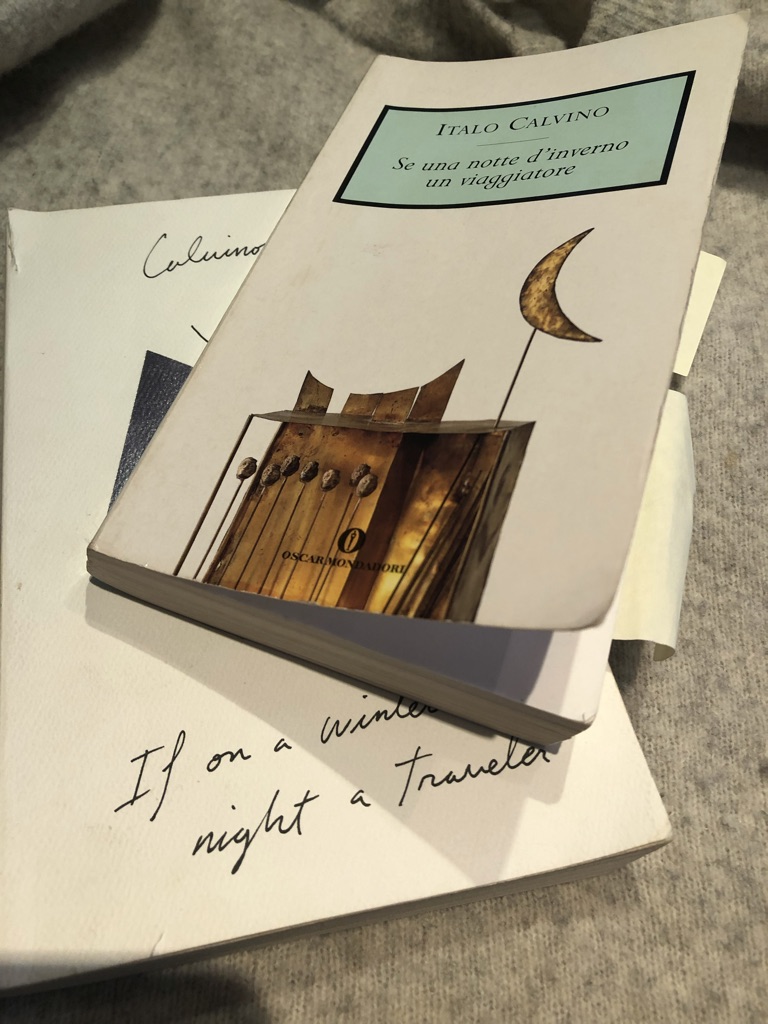
91. Se una notte d’inverno un viaggiatore. Italo Calvino. Read in Italian; Italian Literature, 20th century; Reading and Readers; Phenomenology of reading; postmodern narrative. Translated into English by William Weaver as If on a Winter’s Night a Traveller.
So proud of myself for finally finishing this. What a trip, really! The ten introductory chapters that the Reader (Lettore/Lettrice) must work through, increasingly impatient to find all the missing texts. All the adivce to readers and the narrator’s observations about the phenomenology of reading — and of what we want or expect from stories.
Just grateful to have finished this, right as the year ended, I won’t try to say anymore about it — so much has been written about the landmark novel in the decades since it was first published — except to finish quoting from my (very brief) journal note that I occasionally checked passages with William Weaver’s translation, although this became less and less necessary as I read.
My last Instagram post on this book (I suspect there are many more scattered through the last year and a half, but I’m too keen to finish my 2021 Reading Report to stop and look for them!).
So if you’ve made it all the way to the end of this post, I’d love to know what you think about any of the books in my December reading list — have you read them? Did you love them? (or hate them?) And maybe you’ll share books you read in December that you think some of us might want to read. Books that are getting you through January (whether you’re spending your days on the beach in Australia or your evenings fireside in Quebec). Books you’ve heard about but not yet read. Books you got for Christmas. You get the idea — I’m looking forward to a 2022 full of book conversations with you, right in this space. . . Let’s turn the first page . . .
Thanks for your post of recent reading. I am never “all booked out.”
Author
I know — it’s hard to imagine, isn’t it!
Hello,
I just wanted to say ‘Thank You” so very much for your monthly book reviews. I very much appreciate them and have bought or reread many of the books you have mentioned..
Gabriela
Author
Thanks for taking the time to let me know, Gabriela. So encouraging!
I was pleased to read your comments on The Road. Not many readers seem to know it. And i agree – it is superlative.
Author
I know you meant to write The Door and I’m glad to know another in this community has read and appreciated it as I did.
Always good to see a reading list and thoughtful commentary. Enjoyed Oh, William and Astonish Me. I have been all over the place with my reading these past weeks/months. Among other recently read books: Taste by Stanley Tucci (audiobook read by author–which I highly recommend–nothing like an actor reading his own work); These Precious Days (essays) by Ann Patchett; Sense and Sensibility & Pride and Prejudice (re-read for the umpteenth time); and a score of other less memorable, but still pleasant enough reads. Might be repeating myself. Some items sitting on my TBR pile: The Darkest Evening by Ann Cleeves; along with works of non-fiction such as Patchwork by Claire Wilcox; Erebus by Michael Palin; Cider with Rosie by Laurie Lee and The Face of War by Martha Gellhorn. Like Sue, Mantel’s last volume of her great triology still sits awaiting my attention. Will have to add Standard Deviations.
Clearly, I am not “booked out.”
Author
So many good suggestions here — obviously not booked out!
Most intriguing here for me is the memoir by Claire Wilcox — I’ll rush over to the library website and see if they’ve got a copy.
I actually purchased that book when I was in the UK in October. Might take a while before it makes it over the Pond. 🙂
I read The Hare with Amber Eyes in preparation for seeing the exhibition at the Jewish Museum in New York at Thanksgiving. I borrowed from the library and lucked out with the illustrated version. The show did not disappoint. But I happened upon The Exiles Return by Elisabeth de Waal (Edmund de Waal’s grandmother and a long-time correspondent of Rilke). Her book takes place in Vienna in the 1950s. It’s a romance but also about class and what the city and society were like there following WWII. I so enjoy your book reviews!
Author
I’m so envious that you saw that exhibition — and happy for you, really! 😉
I’ve really enjoyed his books and I will see if I can find a copy of his grandmother’s. He quotes from some of her letters to Rilke in Letters to Camondo.
I just put Oh! William!, Anything is Possible, Le Pays des Autres and My Name is Leo on hold. I’ve got some book club choices to read as well. I’ve read all the Vera books and now I visit her on Britbox. January is definitely reading month.
Author
Oh, I really think you’ll enjoy reading Le Pays des Autres! And the others as well, although I haven’t yet read Anything Is Possible (I know it will be good, though!)
My birthday & Christmas are very close to each other so my book pile is almost toppling over . Nevertheless I’ve ordered the Whitstable murder book ( thanks for that ) . I’ve read & enjoyed Lucy Barton , so must read William too sometime . Olive is my favourite character of hers though . I’m currently reading the latest Peter Grainger that Sue recommended & enjoying that . Also dipping into a quirky book called Bags which I managed to get second hand . It’s a history of handbags from the 1400s to the present , or near enough . It was published by the Victoria & Albert Museum & has lots of lovely illustrations from their handbag collection . Some of those old bags were works of art . You are right , if I didn’t have a book pile calling to me I wouldn’t be happy . Oh & thanks too for the dog book recommendations via Sue . Thanks to you two I have found lots of excellent books that I might never have come across .
Author
Oh, that bags book sounds fabulous — so much cultural history revealed in that kind of focus on a single object through the centuries.
I hope you enjoy those dog books as much as I did. It’s a few years since I’ve read either, but the impression they made is still quite strong.
Thank you so much for this. It’s exactly what I want/need. I’m only just getting back into reading (after not being able to sustain my focus for long enough!)
Also thank you for the link to Sue’s blog. I now have two wonderful blogs with a range of topics right up my alley! x
Author
You’re very welcome, Genevieve. And welcome back into the fold of readers 😉 I think that these days, many of us are hitting periods when sustained reading eludes us (and it’s so easy to get hooked into the internet — as Nicholas Carr points out in his essay/book The Shallows).
Frances, thank you for sharing with us so many beautiful books,such a source of bookiness (I know it is not a word).
Michelle Zauner’ Crying in H Mart is a book about mother and daughter’s complicated relationship,story narrated by daughter, love expressioned (among other things) through Korean food. Her mother was from Seoul (father from US)and they spent vacations regulary in S. Korea with her mother’s family. It is a beautiful book.
I love books where food is a part of the story (first book with this theme I’ve read was J. M. Simmel’s It Can’t Always Be Caviar,more than 40 years ago)
Kazuo Ishiguro’s Klara And the Sun was my first book by this Nobel Prize winning writer,I’ve seen different reviews but I like this complex dystopian novel very much. Narrator is Klara, a solar powered AF (Artificial Friend), chosen by Josie,gravely ill “lifted” (genetically engineered to achieve more in school and career) girl. Klara has to learn a lot about life,but ,at the end,it seems that she was the most emotional,sensible and unselfish one (although her series of AF didn’t have emotions in their settings) compared to human beings. Many questions to think about….can’t wait to read his other books
I’ve forgot to mention Matt Haig’s
Notes on the Nervous Planet-how to cope with life in times of stress,living too fast and human disconnection. I loved it, too
Emily Itami’s debut novel Fault Lines is such an excellent book,well written,poignant and witty,about Mizuki, housewife and mother of two beautiful children,living in Tokyo (and beautiful Tokyo has such an important part in the novel,as well as contradictions between old and new values,between Japanese and western ways,so many things to think about ….)
When she met Kiyoshi,the “god of a man pockmarked with flaws that he hides in his shadows so all you see is his light” it was the start of more love than a simple love affair but “the end of it was in the beggining of it”. It has something similar to The Bridges of Madison County but it is much more than that. Near the end of the novel something struck me very much (no spoilers but I’ll just say it was not dealing with (in)fidelity or love at all- you’ll understand if you were reading it)……Highly recommend!
As always I’ve written too much,sorry , but not everything I’ve wanted to write about, about books I’ve read from your December list etc
Dottoressa
Author
Oh K! This is a fabulous list — and a good example of why my TBR list will never be caught up (and why I don’t mind at all!) Each one of these is going on my list. I’ve read Matt Haig’s The Midnight Library and a few books by Ishiguro, but not the titles you mention, nor have I read any of the others, and they all sound excellent! Thank you!
I too grabbed Elizabeth Strout’s “Oh William” when I saw it at the new releases display at my library. I have enjoyed all her other books so much and this one did not disappoint. At the same time I saw Jhumpa Lahiri’s “Whereabouts”. This is the book she wrote in Italian and then translated back into English. A slender volume, vignettes about a nameless middle aged woman in an unnamed city. It was a nice contrast reading these two minimally plotted books after reading the intricate Magpie Murders. I read Magda Szabo’s ” Abigail” last year year, a coming of age novel which I liked a lot. For one of my book clubs we read an older Kristen Hannah,” Comfort and Joy.” Some of the members of the book club like to read more positive themed books around the holidays and this was selected for that reason. I did indulge in another Ann Cleeves Vera Stanhope mystery. ” the Moth Catcher” . While at the library I saw a book “Fallen” by Linda Castillo, a mystery set in Ohio Amish country. A new release as well. Apparently the latest in a series. For me there was too much gratuitous violence, not sure I will go back and read her others. I will be putting my name of the list of Elizabeth George’s latest Inspector Lynley . I was happy to see that this series is continuing. Today will be a good day for reading , some yoga as it is bitter cold.
Author
Isn’t it good, Oh William? So good!
I read Whereabouts a few months ago, in Italian as Dove Mi Trovo and with the English copy beside so that I could be sure I was “getting it.” What a marvel that she would choose to move so completely into a new language after having achieved what she has in English. Such an impressive willingness to be vulnerable.
I read the Magpie Murders and I can’t think of a greater contrast between the style of these, as you point out. Really clearing the palate!
I should see if I can get a copy of Abigail — I’d be curious to see how she writes about the beginning years; she does old age so well.
But oh, how quickly my eyes dropped to your last lines — Elizabeth George has released a new Inspector Lynley? Clear the decks! (well, clear my spot on the couch, at least 😉 Hope Havers gets a good role in it.
Always love reading your book reviews. You stretch my reading “vocabulary “ and it is much appreciated.
HNY.
Author
Thank you! Very kind of you to let me know. Happy New Year to you as well!
Such a bounty of wonderful-sounding books from you and your readers. Oh William and it’s predecessors and Claire Wilcox’s Patch Work are calling me. Patch Work is to be published here later this month, but while researching that, I’ve also discovered a treasure trove of other books by Wilcox on fashion history and 20th Century designers, which are new to me. I’ve recently read and enjoyed The Truth about Her by Jacqueline Marley, the first novel by an Australian journalist, which looks at single motherhood and the responsibility of journalists to the people they write about, and Janice Hadlow’s The Other Bennet Sister. Hadlow takes the character of Mary Bennet and creates a narrative for her that respects Austen’s Pride and Prejudice but gives her a life of her own. It is a remarkable achievement.
Author
Don’t these comments end up being a great resource for readers? You’ve made a solid contribution! Thank you, titles duly noted. . .
Never booked out here. So many things on your list that are new to me.
Oh William is already hanging on the fringes of my list, only on the fringes because I have been of a mind to reread books in series, and I have wondered if I should reread Lucy Barton first. Now I learn there is another book in between! Oh my! The Door was read long ago, but I put it back on my to read stack sometime last year; haven’t gotten to it yet. Not sure what prompted that, perhaps a mention of it here at some point or another. All my bookish inspirations blur together.
Perhaps I will read My Name is Leon; I will read, finally, The Hare With Amber Eyes. or so she says, she who is tripping over books waiting patiently to be read and is yet always finding more things to read.
Author
I might have guessed you’d already have read The Door. It’s absolutely worth re-reading and I hope you enjoy that. And absolutely, you really, really must get to The Hare — I’m sure you’ll love it!
I really enjoy these reading posts, even though pleasure reading at the moment feels like it is another country, given intensified work in the context of the Omicron wave. That said, I have to step back and not self-flagellate over yet another thing that isn’t happening. There is a time for everything. I am making a list that one day I will be able to get back to.
Many of the books you have listed sound very appealing. In particular, And the Birds Rained Down sounds intriguing. As a person deeply rooted in Ontario and who knows Northern Ontario somewhat I think I’d appreciate this. My favourite places in the whole world are along the north shore of Lake Superior (and Georgian Bay), that get into the bones once you have experienced their austerity and also grandeur (not to mention changes in the weather on the great inland sea, which I remember from trips as a child). Years ago, while a student, my younger brother was a ranger even further north, basically where the roads end. I visited him there in his little trailer. I haven’t read many novels set (even partially) in the northern part of Ontario. I know there are a few out there (Mary Lawson comes to mind, although she has lived in the UK for many years I believe), but the one that sticks most in mind is Jane Urquhart’s The Underpainter, with scenes set on the north shore of Superior. My mom didn’t like the book at all, but I felt that Urquhart understood the landscape in a way that I could relate to.
Author
If you do read And the Birds Rained Down, I’ll be curious to hear what you think. Honestly, I have very limited experience or knowledge of Ontario outside Ottawa and (a few days spent in) Toronto.
I haven’t read The Underpainter (the last Jane Urquhart book I read was The Stone Carvers).
And you know I’m going to vote against the self-flagellation and in favour of taking time for personal reading (or some kind of self-care — napping is also good! 😉
I’ll definitely report back!
It’s funny: this made me realize that I can have a bit of a rebel streak when it comes to reading. I have not read Jane Urquhart’s more recent, more popular novels (the Stone Carvers, Away) – but appreciated her quirkier, lesser-read novels, including The Whirlpool, set in 19th century Niagara Falls (a region that I also know somewhat, having lived there when I was twelve and fascinated with all things regional, historical: the War of 1812, the settlement of the Canadas, the rebellions, the deeply intertwined relationship with the Americans on the other side of the border/river).
The Stone Carvers made me think of a funny encounter I had in Italy one time. G and I were in the Etruscan town of Volterra. We had stopped into the shop of an alabaster carver. When he found out that I was Canadian he got excited and mentioned that at one point he had been enticed to immigrate to Canada, taking a job as a tombstone carver in Sudbury, ON of all places. He remarked that the “food wasn’t great.” Not sure if that was the reason he returned to Italy, but it made me smile.
Author
Ha! Funny to think of Away as one of Urquhart’s “more recent” novels (1993!), but she has been writing for decades, it’s true. I liked The Whirlpool well enough at the time, but it’s a version of Canada that rarely resonated with this West Coast-er. Did you ever read her Changing Heaven? — some of that 1996 book is set in Venice. . .
Cute anecdote about your stone carver — what he would have made of that giant nickel!
I did not read much ficition these last months. There were quite a few sociology and history books on my list, related to the class I was teaching: Stuart Hall (“The Fateful Triangle”) etc. I was intrigued by Didier Eribon’s “Retour a Reims” (in German translation) about his upward move from (French) working class to middle class. And then I found the same subject treated by Linley Hanley for Great Britain (“Respectable”). Fascinating.
Half way between work and pleasure was “Gods of the Upper Air” by Charles King – the history of the establishment of social anthropology as an academic discipline, involving a number of captivating characters like Franz Boas, Margaret Mead, Ruth Benedict…
Another “scientific” book I read for entertainment was “Words in the Mind” by Jean Aitchison. How does the brain store our mental dictionary, and what ways has science to find out about this in the first place?
Then I (re-)read two books before giving them away as Christmas presents: Elizabeth de Waal’s “The Exile’s Return” and Ursula K. LeGuin’s “The Dispossessed” – both in German translation.
I must confess that the last volume of the Ferrante series is still on my bedside table. At the moment I cannot bring myself to finish it. I think the idea of a lost child frightens me too much. The same with Roberto Saviani’s “Gomorra”. It is very uncomfortable reading indeed.
My tbr-list is long and a trip to the public library is indicated, but with Omicron all over the place I do not think that is the right thing to do just now. So I indulged in ordering two books by Claire Wilcox second hand. A more tangible approach to society and history will be a welcome change.
Author
So you’re still (again?) teaching! And it’s got you reading some interesting material, even though that sounds a bit heavy. Stimulating. . .
Another reader (Elizabeth, above) just mentioned having read The Exile’s Return also. That would have been a good Christmas gift.
Enjoy your Claire Wilcox books — a very well-deserved purchase!
I’m late! I’m late! With the excuse that I picked up Katherine Heiny’s Early Morning Riser (and also The Door from the library, based on your recommendation and to be savoured next) and thought I could share thoughts on that, and…
…it is like an expanded version of something…the best I can think of is a Hallmark Christams movie of which I watched two or three with my mother when she was interested in that a few years back. If I had read this first I would have never touched Standard Deviation which would have been a shame. The characters are there but they don’t connect with one another properly which was for me one of the highlights of SD. And NONE of them seem to be mature adults. I am stopped 2/3 in and just skimmed to the end. Life is too short.
I’ve added Fault Lines to my hold list based on D’s comments here, I like the sound of it very much, always hopeful for a new friend to rise from the pile…
Author
Oh, I’m glad you warned me off the Katherine Heiny and glad we found Standard Deviation first. I’ve also added Fault Lines to my hold list — the line for that is much shorter than for the Ishiguro!
I’m late to this post too. I skimmed any comments about O William! It’s in my Kindle library and I’m saving it for a time when I can savour it. Currently taking a hiatus from mystery and reading Maggie O’Farrell’s Instructions for a Heatwave. I have a couple more of hers on my Kindle. I love her writing. Plan to download the new Elizabeth George for our ski holiday next week. Lots of downtime to read then. 🙂
Author
You will LOVE Instructions for a Heatwave! And it’s a mystery as well, although no one gets murdered for it.
I’m torn re the new Elizabeth George — reading her juicy big novels in print is such a particular pleasure, I may just splurge. And in our family, there are at least three of us who will want to read them and it’s not so easy to share e-books (you can hear the defensive rationalization, right?)